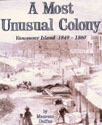
maureen yates duffus
Mayor's Insult Inspired Book
By T.K. Demmings-News Gazette staff
You don't insult a Scot and get away with it. View Royal author Maureen Yates Duffus says the inspiration for her latest book was sparked by a comment by one of Victoria's former mayors. Duffus said the family got its back up when Peter Pollen said he thought the name of Yates Street should be changed. She said the comment inspired her to begin researching the history of her family, which first came to Victoria in 849 That research, which began six years ago, has culminated in Yates first work of historical fiction, A Most Unusual Colony, Vancouver Island 1849-1860.
During those six years, she also wrote two non-fiction books, Craigflower Country and Beyond the Blue Bridge. A former journalist, Dutfus started out as reporter in the old "social room ghetto," cov ering Ottawa diplomatic receptions. She was later a columnist and editor of tile Victoria Times living section. Duffus said that as a former reporter, she had a fright when she first realized her book had to be a work of fiction. "I think it makes it more readable for people who are not academics or scholars," she said.
The bulk of the book is a series of fictional letters and journal entries written by Duffus's real-life great-grandmother Mary Yates, and her great-grandfather James Yates. "I like the immediacy of the letter and describing what she was doing at that time."
Duffus said that she knew the basic history of the family but never realized the challenges her ances tors faced when they came to Fort Victoria. During painstaking research at the provincial archives, Yates made the kind of discovery researchers live for. She found an original picture of her great- grandparents still in its leather jacket. "I practically shouted, 'Eureka!' in the middle of the archives," she said.

Tale of fictional letters
based upon family's past
Book review by T.K. Demmings - News Gazette Staff
Maureen Duffus has written a family history like no other: the great-granddaughter of James and Mary Yates, Duffus's book A Most Unusual Colony, tells the story of her ancestors in the most intimate way. The bulk of the book is composed of fictional letters and journal entries based upon real-life events of her great-grandmother, Mary Powell Yates. In the telling of the story, Duffus has created a book that not only reveals much about life on Vancouver Island from 1849 to 1860, but also offers an enjoyable read. The book is a world unto itself as Duffus has not only created the fictional letters, but also dreamed up a fictional writer to compile and link the letters together with interspersed narration. In doing this Duffus becomes an omniscient editor, adding in explanatory notes in sidebars that sit along with the main text. In keeping with the fictionalized world, Duffus the editor occasionally corrects the writer's recollections. Historical photographs and maps complement the book as well.
The fictional writer is Kate Murray, a young girl who has come over on the same ship as the Yates and who is taken under Mary's wing, and later lives with the family. In the book's forward, written by Kate in 1902, Duffus sets the premise for the story by revealing that Mary Yates' sister-in-law, Emma, has brought a packet of Mary's old letters for Kate to read.
Throughout the rest of the book, Kate's recollections are mingled with Mary's letters. In this female world, the reader is treated to a minutiae of details that provide the most fascinating glimpse of life in the colony. From remarks about Mary's primitive stove to comments on James's troubles with the Hudson Bay Company, and Kate's description of the fashions in the colony, or lack of them, we are drawn into the Yates's warm, family life.
There is a genuine humor in the book too, coming most often from Mary. "The weather has been very cold. I am cross and irritable, Emma Frances and baby Harriet fretting, and James keeps saying dinna fash yourself lass, in an offhand way, which makes me want to lose my temper completely. It is the worse time of the year, but I suppose no drearier than Home in January."
The book also serves as a social history of the Western Communities, as Kate befriends the young Langford girls and often visits as their farm, Colwood. Metchosin and Sooke also figure in the book as pioneers strike out to claim land, Craigflower Farm and the McKenzies and other settler families play parts as well.
The only quibble to note is the format of the book, which is an 8.5-inch by 9-inch soft cover. While the format makes it a convenience for the designer to print Duffus's editorial notes, it makes the book difficult to read in a bath tub. And this book, although rife in historical detail, is exactly the type of book to read by the fireplace -- or in the tub.
A Most Unusual Colony:Vancouver Island 1849-1860 by Maureen Yates Duffus
. About the author:
Maureen Duffus is a former Journalist (Ottawa Citizen, Victoria Daily Colonist) Starting as a reporter in the the "Social Room ghetto", she covered Ottawa diplomatic receptions, Victoria government house garden parties and other frivolities. She was later a columnist and editor
of the Victoria Times Living Section.
As science writer at the Patricia Bay Institute of Ocean Sciences she prepared science articles and newsletters, translating science into English for non-scientist readers.
Previous publications:
Craigflower Country (regional history) 1993
Beyond The Blue Bridge-Stories from Esquimalt (Editor)1990
Numerous freelance articles related to BC history
Other interests:
Volunteer with dance organizations, the Canadian Costume Museum, View Royal Community Archives.
Married to Vancouverite Dr. John Duffus, physicist. Two sons, a broadcaster and an engineer. Lives on a seven-acre farm near Victoria, next to the site of the HBC's 1849 sawmill at Millstream Falls.
back|contents|crest|dedication|family trees|
|scottish
church records|tartans
© 1998 David Duffus. All rights reserved.
Design by David Duffus